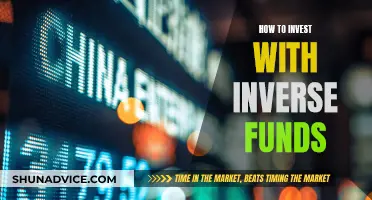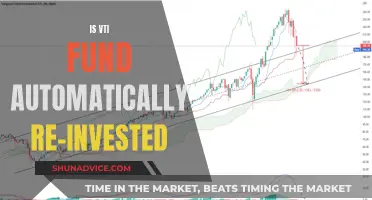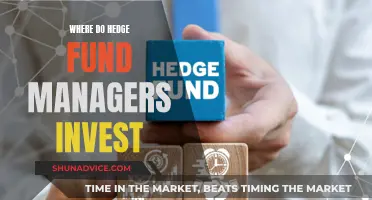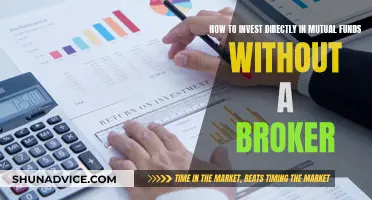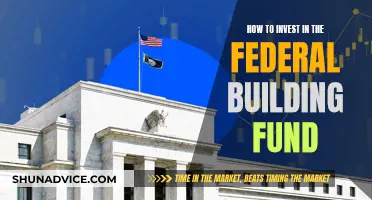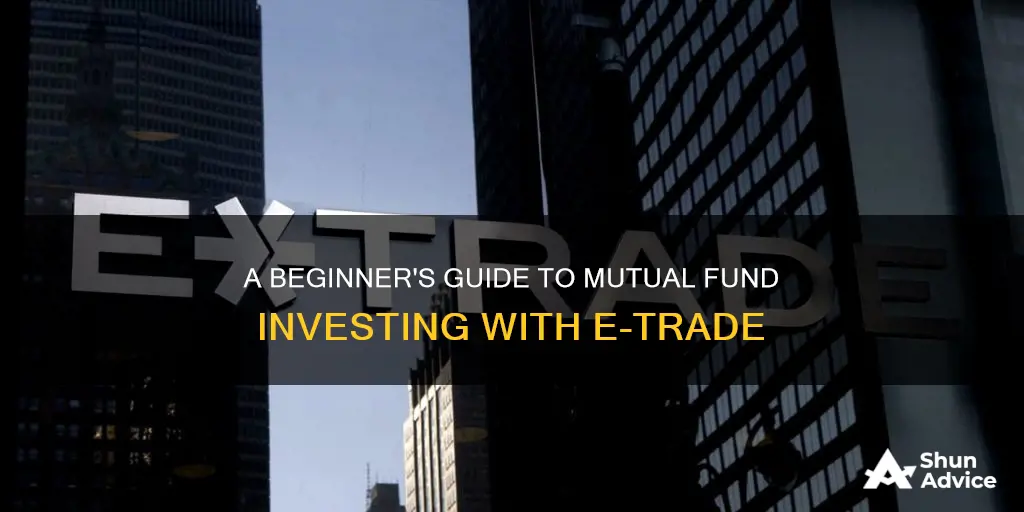
Investing in mutual funds through E*TRADE from Morgan Stanley offers a range of benefits, including access to thousands of funds and a simple way to diversify your portfolio. E*TRADE provides a platform for investing in mutual funds, which are professionally managed funds that pool money from many investors to buy securities such as stocks and bonds. With E*TRADE, you can choose from over 6,000 mutual funds, including those with specific trading strategies, investment types, and financial goals. The platform also offers tools to help you find the right funds to meet your investment objectives. One of the key advantages of investing in mutual funds through E*TRADE is the absence of load or transaction fees, allowing you to invest without paying loads, transaction fees, or commissions. Additionally, E*TRADE provides access to Vanguard mutual funds as part of its no-load, no-transaction-fee program, further expanding your investment options.
What You'll Learn

E*TRADE's no-load, no-transaction-fee program
E*TRADE offers investors the ability to invest in thousands of mutual funds directly through its no-load, no-transaction-fee program. This means that investors can access over 4,400 mutual funds without paying loads, transaction fees, or commissions. However, to discourage short-term trading, E*TRADE Securities will charge an Early Redemption Fee of $49.99 on redemptions or exchanges of no-load, no-transaction-fee funds that are held for less than 90 days.
With as little as $25 per recurring investment, automatic investing gives investors access to no-load, no-transaction-fee mutual funds by purchasing shares at regular intervals and in equal amounts. E*TRADE also provides prebuilt portfolios of leading mutual funds, offering conservative, moderate, aggressive, and income-generating strategies. These portfolios can be customized to meet an investor's specific needs, and investors have the freedom to buy or sell individual funds at any time.
E*TRADE is the only major online broker to offer Vanguard mutual funds within its no-load, no-transaction-fee program. This allows customers to access 124 Vanguard mutual funds for their investment strategies without transaction fees. Investors can choose from a wide variety of actively managed funds, including alternative, balanced, domestic and international equity, sector, municipal and taxable bond, and target-date funds.
It is important to note that E*TRADE does not make any representations, endorsements, or guarantees regarding the appropriateness, quality, or suitability of any mutual fund, and does not make any recommendations. Investors should carefully read and consider a mutual fund's prospectus, which contains its investment objectives, risks, charges, expenses, and other important information, before investing.
Mortgage Investment Strategies to Boost College Funds
You may want to see also

E*TRADE's commission-free ETF program
E*TRADE offers a commission-free ETF program that allows investors to buy and sell exchange-traded funds (ETFs) without paying brokerage commissions. This program provides access to a diverse range of ETFs, enabling investors to build a portfolio aligned with their specific market strategies, investment types, and financial goals.
ETFs, similar to mutual funds, are baskets of individual stocks, bonds, or other investments. They are typically managed to replicate the performance of a certain index, such as the NASDAQ 100 or S&P 500. ETFs offer trading flexibility as they can be bought and sold throughout the trading day or as part of more sophisticated trading strategies.
The commission-free ETF program provides access to leading ETFs with no trading fees and a low minimum investment requirement. Investors can choose from conservative, moderate, aggressive, and income-generating strategies to build a portfolio that matches their risk tolerance and financial objectives.
It is important to note that, while there are no brokerage commissions, ETFs do charge management and other fees (expense ratio) that are included in the value of the fund and disclosed in the prospectus. Additionally, to discourage short-term trading, E*TRADE may charge a short-term trading fee on sales of participating ETFs held for less than 30 days.
E*TRADE has contracted with certain ETF companies to receive compensation for the purchase of ETFs offered through the commission-free program. This compensation is paid by an affiliate of the ETF and is based on initial setup fees and a percentage of invested assets, ranging from 0 to 0.15% per annum, depending on the fund company.
Investors can learn more about the commission-free ETF program and explore the available ETF options by visiting the E*TRADE website or contacting their customer support.
Investing Funds: Where to Start for Maximum Returns
You may want to see also

Choosing a mutual fund
When choosing a mutual fund, it is important to consider several factors that can impact your investment returns. Here are some key points to keep in mind:
Investment Objectives and Strategies
Before investing in a mutual fund, carefully review its prospectus, which outlines the fund's investment objectives, strategies, and associated risks. Understanding the fund's goals and approach will help you assess if it aligns with your own investment goals and risk tolerance.
Fees and Expenses
Mutual funds charge various fees, including investment management fees and other ongoing expenses. These fees can vary significantly from fund to fund and across different share classes of the same fund. Be sure to review the prospectus's fee table to understand the costs associated with each fund and share class. Additionally, consider the fund's expense ratio, as higher expense ratios can reduce your overall investment returns.
Types of Share Classes
Mutual funds typically offer different share classes, such as 12b-1 fee-paying share classes (often Class A shares) and Non-12b-1 fee-paying share classes. 12b-1 fees are charged annually against the fund's assets to cover marketing and distribution costs. These fees can impact fund performance, so it's essential to consider them when choosing a share class. Non-12b-1 fee-paying share classes, on the other hand, do not have sales charges or ongoing 12b-1 fees, making them a more economical option in most cases.
Performance and Returns
While past performance does not guarantee future results, it is essential to consider a mutual fund's historical performance. Review the fund's performance metrics and compare them with similar funds to assess how well it has performed over time. Additionally, consider the fund's diversification and the types of investments it holds to understand the potential for portfolio loss.
Minimum Investment Requirements
Mutual funds usually require a minimum investment dollar amount. Ensure you review the minimum investment requirement for the fund you're considering and assess whether it aligns with your financial capabilities.
Tax Implications
Be mindful of the tax implications associated with mutual funds. Unless held in a tax-advantaged account, shareholders typically have to pay taxes on dividends and capital gains distributions, even if the fund loses value. Consult with a tax advisor to understand how taxes may impact your investment returns.
By carefully considering these factors, you can make a more informed decision when choosing a mutual fund that aligns with your investment goals, risk tolerance, and financial situation. Remember to review the fund's prospectus and seek professional advice when needed to ensure you have a comprehensive understanding of the fund before investing.
Dividend Fund Investment: A Guide to Smart Investing
You may want to see also

ETFs vs. mutual funds
Exchange-traded funds (ETFs) and mutual funds are both collections, or "baskets", of individual stocks, bonds, or other investments. They are managed by experts who choose and monitor the stocks or bonds the funds invest in. However, there are some key differences between the two.
Similarities
ETFs and mutual funds are similar in that they both represent professionally managed collections (or "baskets") of individual stocks or bonds. They are both less risky than investing in individual stocks and bonds and they both offer a wide variety of investment options.
Differences
ETFs are like stocks in that they can be traded intra-day on major stock exchanges. Mutual funds, on the other hand, can only be purchased at the end of each trading day based on a calculated price known as the net asset value. ETFs can be bought for the price of a single share, whereas mutual funds usually require a minimum investment amount. ETFs are usually passively managed, whereas mutual funds are actively managed by fund managers. Actively managed funds tend to have higher fees and expense ratios. ETFs are also more tax-efficient than mutual funds.
Whether you choose to invest in ETFs or mutual funds depends on your goals and the type of investor you are. If you want to be able to trade during the day, ETFs are a better choice. If you are looking for a fund that could potentially beat the market, then a mutual fund may be more suitable. If you want to keep costs down, ETFs tend to be cheaper to invest in.
Equity and Debt Funds: Diversifying Your Investment Portfolio
You may want to see also

Mutual fund share classes
When investing in mutual funds through E*TRADE, it is important to understand the different share classes available. A single mutual fund usually offers different pricing arrangements or "classes" of its shares to cater to investor preferences and needs. Each share class represents an investment in the same mutual fund portfolio but provides investors with a choice of how, when, and whether to pay for fund distribution costs.
Class A Shares
Class A shares charge upfront fees and have lower expense ratios, making them ideal for long-term investors. They are also advantageous for wealthy investors as they reduce upfront fees for larger investments. Class A shares tend to have lower 12b-1 fees, which are marketing and distribution fees included in the fund's expense ratio. If you plan on holding these shares for an extended period, the front-end load can result in long-term benefits.
Class B Shares
Class B shares, also known as B-shares, charge high exit fees and have higher expense ratios than Class A shares. However, they convert to A-shares if held for several years. These shares are typically suitable for investors with limited cash and a long investment horizon. One of the advantages of Class B shares is the absence of front-end fees, allowing your entire initial investment contribution to benefit from capital gains and interest income. The longer you hold these shares, the lower the deferred sales charge, making them attractive for investors with long-term horizons.
Class C Shares
Class C shares, or C-shares, are a type of level-load fund that charges an annual fee. This class is often popular with retail investors and is best suited for short-term investors. One of the advantages of Class C shares is the absence of front-end fees, allowing your entire initial investment to earn interest income. Additionally, the back-end load is typically waived after holding the shares for one year. However, Class C shares have higher expense ratios than Class A shares, and many of them cannot be converted into Class A shares, making them unsuitable for long-term investment horizons.
It is important to carefully consider the different share classes and their associated fees and expenses before investing in a mutual fund through E*TRADE. The prospectus of the fund contains crucial information about the fees, risks, and investment objectives, and it should be reviewed thoroughly before making any investment decisions.
Appaloosa Hedge Fund: A Guide to Investing Wisely
You may want to see also


